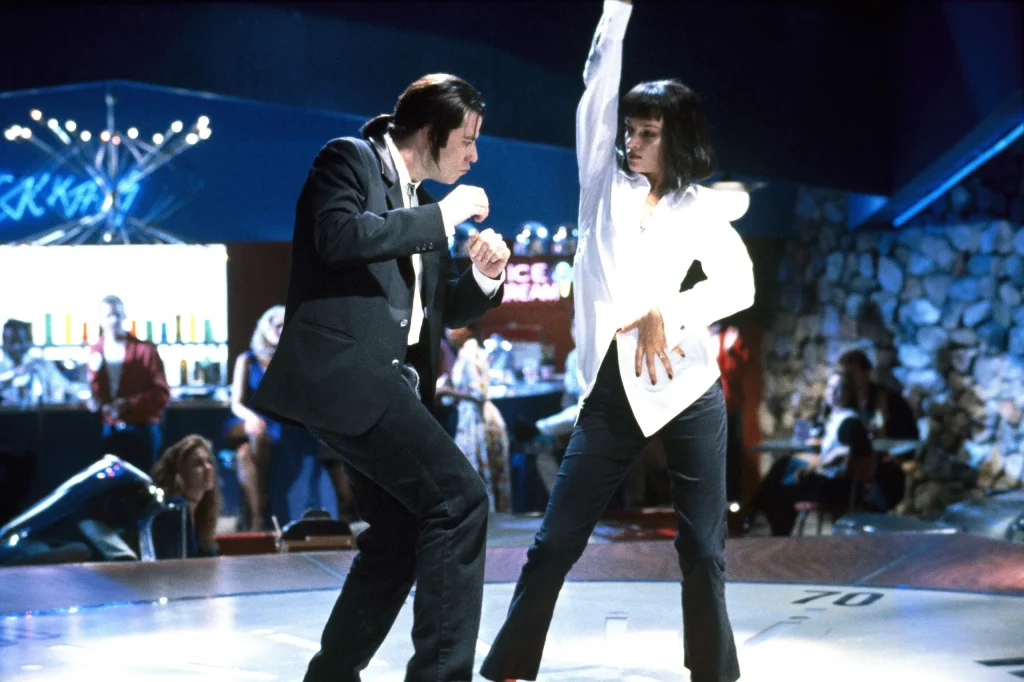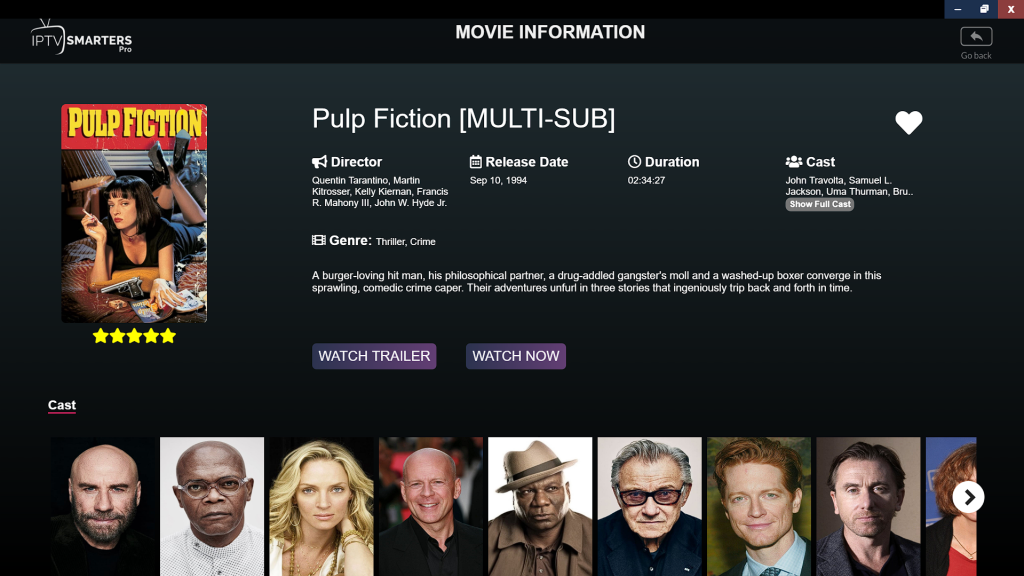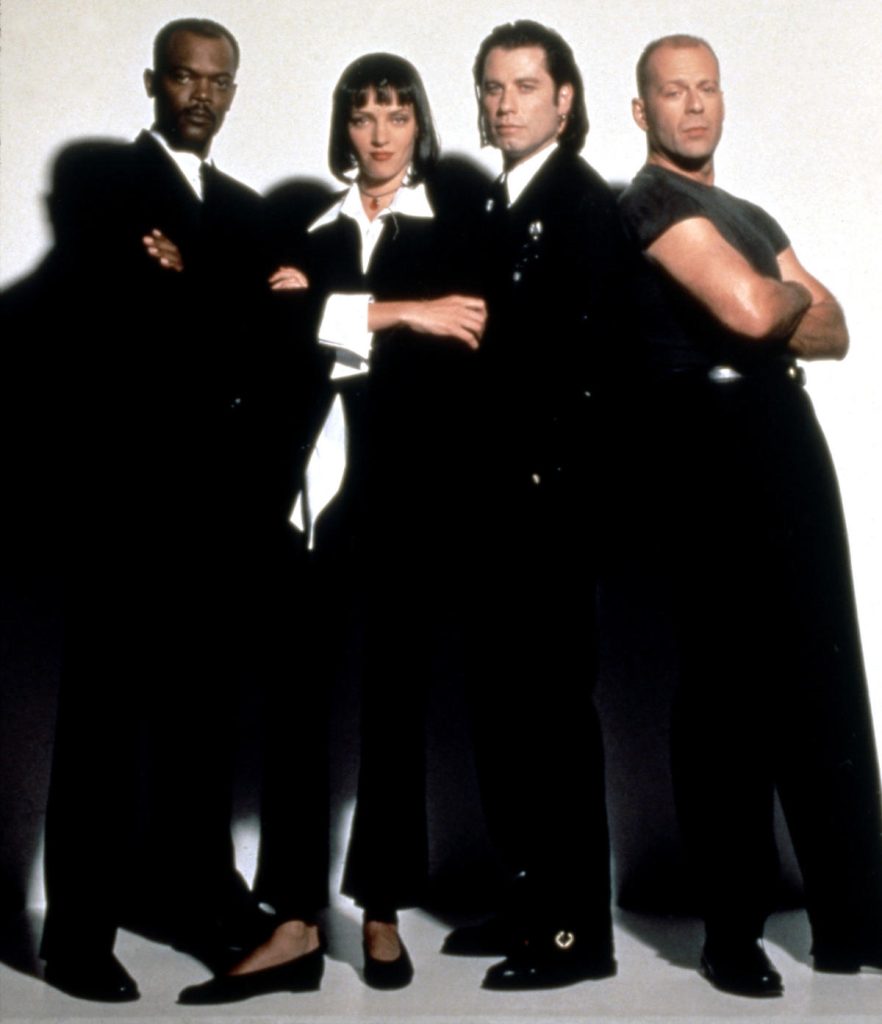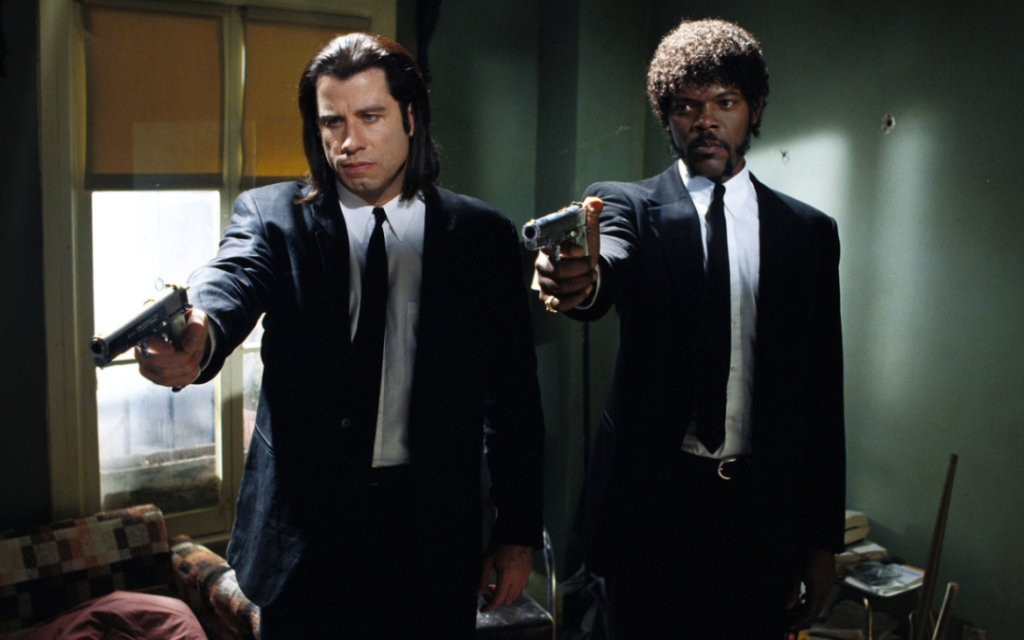
Few films have left as indelible a mark on modern cinema as Quentin Tarantino’s Pulp Fiction. Released in 1994, this movie is a true cultural touchstone, lauded for its innovative storytelling, unforgettable characters, and iconic dialogue. Whether you’re a seasoned movie buff or just looking for something fresh and engaging to watch, Pulp Fiction offers an experience that’s hard to forget. In this IPTV Trends review, we’ll dive deep into what makes this film a must-watch and why it continues to resonate with audiences nearly three decades after its release.
Wanna watch Pulp Fiction online on IPTV Trends ? Click HERE & get a Free IPTV Trial RIGHT NOW !
Background and Context

Pulp Fiction Movie Review
At its core, Pulp Fiction is a crime film, but calling it that would hardly do it justice. The movie weaves together several interconnected stories involving a quirky ensemble of characters. There’s Vincent Vega (John Travolta) and Jules Winnfield (Samuel L. Jackson), two hitmen with a penchant for philosophical discussions. There’s also Mia Wallace (Uma Thurman), the wife of crime boss Marsellus Wallace (Ving Rhames), who shares a memorable night with Vincent. Then, we have Butch Coolidge (Bruce Willis), a boxer caught in a dangerous double-cross.
What makes Pulp Fiction stand out is its non-linear narrative. The story jumps around in time, which might seem confusing at first but ultimately serves to keep the audience engaged, piecing together the puzzle of how these stories fit together. It’s a film that rewards attention to detail, and every time you watch it, you might catch something new. If you’re using the IPTV Trends login, make sure to save this title in your watchlist.
Historical Significance
When Pulp Fiction premiered at the Cannes Film Festival in 1994, it took home the prestigious Palme d’Or, a sign of its immediate impact on the film world. The movie wasn’t just a commercial success—it was a cultural phenomenon. It played a major role in the rise of independent cinema in the 1990s, proving that you didn’t need a big budget or a traditional plot structure to make a hit film. For more insights on this classic, don’t miss our detailed IPTV Trends review.
I remember the first time I saw Pulp Fiction. It was at a small theater that specialized in indie films. The buzz around it was immense, and the theater was packed. By the time the credits rolled, it was clear that we had all just witnessed something special—something that would change the way we thought about movies. Watching it again on IPTV Trends only reinforced that sentiment.
Key Elements of the Movie
Direction and Writing
Quentin Tarantino’s fingerprints are all over Pulp Fiction. As both director and writer, he brings a distinctive style that combines sharp, witty dialogue with scenes of intense violence and dark humor. Tarantino has a gift for making mundane conversations fascinating—whether it’s Vincent and Jules debating the finer points of European fast food or discussing the etiquette of foot massages, the dialogue crackles with energy. Make sure to check this out on IPTV Trends after your IPTV Trends login.
The non-linear storytelling is another hallmark of Tarantino’s style. Instead of following a straightforward narrative, Tarantino jumps back and forth in time, forcing the audience to actively engage with the plot. This approach might frustrate some viewers on their first watch, but it also makes the film endlessly rewatchable. You’re always discovering new connections between the characters and events.
One scene that stands out to me is the famous “diner scene” where Jules, after a near-death experience, decides to quit the life of crime. The tension is palpable as he confronts a pair of amateur robbers, but it’s his reflection on redemption that adds layers to his character. Tarantino’s writing here is top-notch, blending suspense with introspection in a way that few other filmmakers can achieve.
Wanna watch Pulp Fiction online on IPTV Trends ? Click HERE & get a Free IPTV Trial RIGHT NOW !
Character Analysis

Pulp Fiction boasts an ensemble cast of characters, each with their own quirks and motivations. John Travolta’s Vincent Vega is a hitman with a laid-back attitude, but there’s a sense of weariness beneath his cool exterior. Travolta’s performance is a masterclass in subtlety—he’s not just a thug; he’s a man trying to navigate the dangerous world he’s found himself in.
Samuel L. Jackson’s Jules Winnfield, on the other hand, is the polar opposite. He’s loud, charismatic, and deeply philosophical. Jules’s transformation from a cold-blooded killer to a man seeking redemption is one of the film’s most compelling arcs. Jackson’s portrayal of Jules is iconic, and his delivery of lines like “The path of the righteous man” has become the stuff of cinematic legend. Explore more about these iconic characters with your IPTV Trends login.
Uma Thurman’s Mia Wallace is another standout. She’s enigmatic, exuding both confidence and vulnerability. The scene where Mia and Vincent share a milkshake at the retro diner is filled with tension and chemistry, culminating in the infamous dance sequence. It’s a moment that perfectly encapsulates the film’s blend of humor and unease.
Bruce Willis’s Butch Coolidge adds yet another layer to the story. He’s a boxer who refuses to throw a fight and ends up on the run from Marsellus Wallace. Butch’s story is the most traditional in structure, but it’s also one of the most visceral. His determination to survive leads to some of the film’s most intense scenes, including the infamous pawn shop sequence.
Wanna watch Pulp Fiction online on IPTV Trends ? Click HERE & get a Free IPTV Trial RIGHT NOW !
Cinematography and Visual Style
Visually, Pulp Fiction is a feast for the eyes. Cinematographer Andrzej Sekuła creates a world that feels both gritty and vibrant. The use of color is particularly striking—think of the bright red of the diner booths or the neon glow of the Jack Rabbit Slim’s restaurant. Each scene is meticulously framed, with camera angles that heighten the tension and draw you deeper into the story.
The film’s cinematography is also a masterclass in contrasts. One moment, you’re in a dimly lit apartment watching a brutal execution; the next, you’re in a brightly lit diner, eavesdropping on a quirky conversation about hamburgers. These visual shifts keep the audience on their toes, never letting you settle into a comfortable viewing experience.
One thing I’ve always appreciated about Pulp Fiction is how it captures the essence of Los Angeles. The city isn’t just a backdrop—it’s a character in its own right. From the seedy motels to the retro diners, the film paints a vivid picture of a city where anything can happen. It’s a place that feels both familiar and foreign, much like the film itself.
Soundtrack and Score
The soundtrack of Pulp Fiction is nothing short of iconic. Tarantino has a knack for picking songs that not only fit the scenes but elevate them to a whole new level. The opening credits set to Dick Dale’s surf rock classic “Misirlou” immediately grabs your attention, setting the tone for the wild ride ahead.
Each track on the soundtrack feels like it was made for the scene it accompanies. Take, for instance, Chuck Berry’s “You Never Can Tell,” which plays during the dance contest at Jack Rabbit Slim’s. The upbeat tune contrasts with the underlying tension between Vincent and Mia, creating a memorable and oddly poignant moment.
Tarantino’s use of music extends beyond just setting the mood—it becomes a character in the film. The songs are so perfectly integrated into the story that it’s hard to imagine the film without them. Every time I hear “Girl, You’ll Be a Woman Soon” by Urge Overkill, I’m instantly transported back to that scene where Mia overdoses. It’s a powerful reminder of how music can amplify the emotional impact of a scene.
Wanna watch Pulp Fiction online on IPTV Trends ? Click HERE & get a Free IPTV Trial RIGHT NOW !
Thematic Exploration

Violence and Morality
Pulp Fiction doesn’t shy away from violence. In fact, it embraces it. But what sets the film apart is how it handles violence—not as mere spectacle, but as a narrative tool that reveals character and explores moral ambiguity. The characters in Pulp Fiction inhabit a world where violence is a part of everyday life, yet the film challenges us to think about the consequences of their actions.
Jules Winnfield’s journey is a perfect example of this. His brush with death forces him to confront the violence he’s inflicted on others and question his place in the world. His decision to walk away from a life of crime is a powerful moment of self-reflection, raising questions about fate, redemption, and free will.
Tarantino also plays with the audience’s expectations of morality. There are no clear heroes or villains in Pulp Fiction—just flawed individuals making choices in a morally complex world. This ambiguity forces the audience to engage with the film on a deeper level, considering the motivations and consequences of each character’s actions.
Cultural Impact
It’s hard to overstate the cultural impact of Pulp Fiction. The film didn’t just succeed at the box office—it became a phenomenon that influenced everything from fashion to dialogue in other films and television shows. Phrases like “royale with cheese” and “Zed’s dead” have become part of the pop culture lexicon, quoted and referenced by fans and creators alike.
The film also had a significant impact on independent cinema. Before Pulp Fiction, indie films were often seen as niche or experimental. But Tarantino’s success proved that independent films could be commercially viable and appeal to mainstream audiences. This opened the door for a new generation of filmmakers who were willing to take risks and push boundaries.
On a personal note, Pulp Fiction was one of the first films that made me realize the power of cinema to shape culture. It wasn’t just a movie—it was an event, something that people talked about and dissected long after the credits rolled. Watching it again on IPTV Trends was like revisiting an old friend—familiar, yet still full of surprises.
Conclusion
Pulp Fiction is more than just a movie; it’s a cinematic experience that has stood the test of time. From its innovative storytelling to its unforgettable characters and dialogue, the film continues to captivate audiences nearly 30 years after its release. Whether you’re revisiting it for the umpteenth time or watching it for the first time, Pulp Fiction offers something new with every viewing.
If you haven’t yet seen Pulp Fiction, or if it’s been a while since your last viewing, I highly recommend checking it out on IPTV Trends. With its extensive library of classic and contemporary films, IPTV Trends is the perfect platform to experience this masterpiece. Just make sure you’re ready for a wild ride—you won’t be disappointed.
For more insights like this, don’t forget to explore our other IPTV Trends reviews. And if you’re not yet a subscriber, consider creating your IPTV Trends login today to start streaming the best that cinema has to offer.
Check out our IPTV Trends blog for more articles.
Wanna see what the fuss is about ? Click HERE & get a Free IPTV Trial RIGHT NOW !

